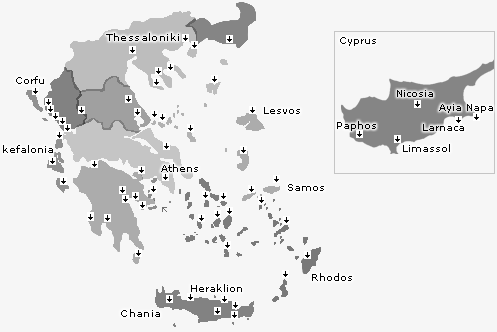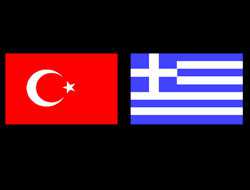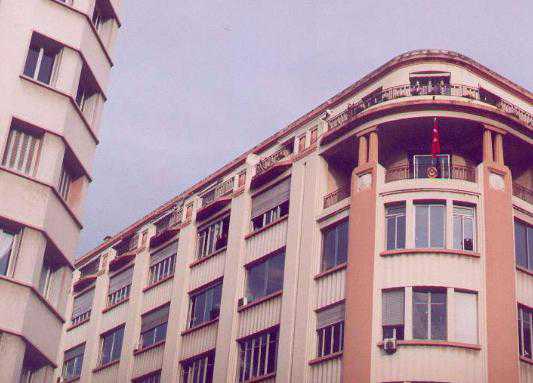Proposal document from National Archives to cede Cyprus to Greece.

Download

Proposal document from National Archives to cede Cyprus to Greece.

Download

 Melbourne, 07.09.2010
Melbourne, 07.09.2010
The new Deputy Minister of Foreign Affairs, Dimitris Dollis, stated to “Neos Kosmos” that the decision of the Prime Minister, George Papandreou, to include him in the new cabinet is a “great honor and a great challenge”.
He said that his appointment as one of the two Deputy Prime Ministers is an “honor for the Greeks of Australia but also for the Greek Diaspora in general”.
Mr. Dollis made a commitment that he will do “the best possible for the Greek Diaspora”, from his current position as well, within the framework of the government’s policy.
Dimitris Dollis was born in Kastoria. He developed his political activities in the state of Victoria, in Australia, where his family emigrated when he was 15 years old. Within the 29 years he spent in Australia, he served as City Councilor, Member of the Parliament*, Shadow Minister and Deputy Leader of the Labor Party. When he returned to Greece, he was appointed as the General Secretary for Greeks Abroad of the Greek Government.
He made a close connection with George Papandreou and supported him during his course. As the Prime Minister of Greece, George Papandreou appointed him as Ambassador-at-Large and Special Envoy of the PM for the release of the Greek teacher Thanassis Lerounis, who had been abducted by the Taliban.
Source: ANA–MPA

 Turkish and Greek journalists, who got together at a media conference in Turkey’s Aegean province of Izmir on Saturday, agreed to set up a joint association.
Turkish and Greek journalists, who got together at a media conference in Turkey’s Aegean province of Izmir on Saturday, agreed to set up a joint association.Turkish and Greek journalists, who got together at a media conference in Turkey’s Aegean province of Izmir on Saturday, agreed to set up a joint association.
Journalists from Turkey and Greece, who met at a round-table meeting as part of “The 6th Turkish-Greek Media Conference”, unanimously approved the establishment of “Turkish-Greek Journalists’ Association”.
Moreover, the conference’s gala dinner was held at Izmir’s Swissotel with the participation of journalists and high-level officials from Turkey and Greece.
Speaking at the gathering, Greek Deputy Premier Theodoros Pangalos said Turkey and Greece had a common history and culture, adding that the two countries could use such values against globalization.
AA
, 19 September 2010


ATHENS, Greece — Unidentified assailants threw firebombs at the Turkish consulate in Thessaloniki on Saturday (September 18th). No one was injured in the attack. The bombs were hurled by a group of 15 people who targeted a guard post outside the consulate. “We consider this an attack against Greek police rather than against the consulate,” the police said. A similar incident happened on August 12th. (AFP, DPA, Hurriyet – 18/09/10)

 An improving dialogue between Turkey and Greece seeks to minimize potential risks over the Aegean by grounding the so-called dog-fighting between the two countries’ militaries and further promoting areas of common interest, the Turkish foreign minister said Friday.
An improving dialogue between Turkey and Greece seeks to minimize potential risks over the Aegean by grounding the so-called dog-fighting between the two countries’ militaries and further promoting areas of common interest, the Turkish foreign minister said Friday.
“We have differing positions with Greece on certain subjects but the way to overcome them is with dialogue. If the dialogue is not enough, then more dialogue. There is no other alternative,” Foreign Minister Ahmet Davutoglu told a small group of journalists in the Central Anatolian province of Konya, where he attended a rally ahead of the Sept. 12 constitutional referendum.
“Just as the difference in opinions between Turkey and Greece over the Aegean and other areas, we also have areas of common interest. To expand common interests and to minimize differences – this is the objective of our explorative talks,” said Davutoglu.
The 46th round of exploratory talks between the Turkish and Greek foreign ministries’ diplomats took place in Athens on Friday.
The foreign minister said the talks focused on overcoming differences over a wide range of issues, including the Aegean disputes, through confidence-building measures that resumed after the Papandreou government took office in Athens after a long break. He said the resumption of talks was complementary to efforts to establish a high-level strategic cooperation council between Turkey and Greece and increase bilateral political consultations.
Davutoglu said he would visit Greece in the fall, which follows a recent trip to Turkey by Greece’s Alternate Foreign Minister Dimitris Droutsas.
“Right now there is an optimistic process ahead of us that continues on the basis of bona fide and mutual trust,” Davutoglu said.
Two Greek F-16 aircrafts crashed Thursday during a dog-fight exercise, a military practice aimed at training Greek jets against interceptions with Turkey over the Aegean. One Greek pilot reportedly died during the exercise.
Asked if exploratory talks would bring a halt to dogfights over the Aegean, Davutoglu said: “That is our objective. Why are those talks being held? Not just for the sake of meeting but to minimize risks over the Aegean and expand common interest areas. I hope any negativity can be overcome based on good neighborly relations.”
No unilateral Cyprus step
Another common problem between Turkey and Greece is the decades-old Cyprus dispute. Davutoglu said if Greek Cypriots had voted “yes” for a U.N. blueprint for reunification with the Turks of the island during a 2004 referendum, no Turkish troops would remain on the island now except for a symbolic number of soldiers.
“No unilateral step should be expected from the Turkish side unless commitments are fulfilled,” he said. “Turkey has taken many progressive steps in the past, but unfortunately neither the European Union nor international actors fairly reciprocated those steps.”
Davutoglu said the Turkish Cypriot presidency, led by hardliner Dervis Eroglu, was proceeding on negotiations with Greek Cypriots, contrary to what was expected from the new president after the presidential elections in the north in May. The foreign minister also heralded Eroglu’s plan to hold talks in New York in the coming period.
Referring to U.N. special envoy Alexander Downer’s report, set to be released in November, Davutoglu said, “It is important that Downer set a deadline for November, otherwise negotiations [between the Cypriot leaders] will go on for decades.”
Meeting with Armenian FM
Commenting on relations with Armenia, Davutoğlu did not rule out talks with his Armenian counterpart, Edward Nalbandian, on the sidelines of the annual U.N. General Assembly meetings next month.
“Nothing has been planned yet; there will be plenty of bilateral talks with foreign ministers from other countries,” said Davutoglu. “We have already met with Mr. Nalbandian on a number of occasions. Another meeting may take place in New York, contacts will continue.”
Two conditions still in place in Israel dispute
Davutoglu, touching upon the crisis in relations with once-regional-ally Israel due to the deadly raid on a Gaza-bound aid flotilla, said five out of the seven conditions for the restoration of bilateral relations with Tel Aviv have been fulfilled.
He elaborated that the three ships were handed over to Turkey; passengers aboard the ships were released; passengers were not tried; the aid to the Gaza Strip, controlled by Hamas, reached its destination; and two separate international commissions were established.
“Five conditions have been met. We are now waiting for the other two conditions to be fulfilled,” said Davutoglu, referring to the government’s earlier demands for Israel to apologize and compensate the victims.
He said the two remaining demands were not only coming from Turkey, but also from the international community, citing a U.N. Security Council presidency statement in the wake of the May 31 flotilla incident that left nine people dead.
Davutoglu also said Turkey was very closely following the ongoing investigations of two U.N. commissions; one in Geneva established by the U.N. Human Rights Council and another in New York set up upon recommendation from Secretary-General Ban Ki-moon.
“We are seriously contributing to both commissions. We need to see the results of the inquiries,” the minister said. “Turkish-Israeli relations should be evaluated in the context of all these developments.”
, 28 August 2010
|
An improving dialogue between Turkey and Greece seeks to minimize potential risks over the Aegean by grounding the so-called dog-fighting between the two countries’ militaries and further promoting areas of common interest, the Turkish foreign minister said Friday.
“We have differing positions with Greece on certain subjects but the way to overcome them is with dialogue. If the dialogue is not enough, then more dialogue. There is no other alternative,” Foreign Minister Ahmet Davutoglu told a small group of journalists in the Central Anatolian province of Konya, where he attended a rally ahead of the Sept. 12 constitutional referendum. “Just as the difference in opinions between Turkey and Greece over the Aegean and other areas, we also have areas of common interest. To expand common interests and to minimize differences – this is the objective of our explorative talks,” said Davutoglu. The 46th round of exploratory talks between the Turkish and Greek foreign ministries’ diplomats took place in Athens on Friday. The foreign minister said the talks focused on overcoming differences over a wide range of issues, including the Aegean disputes, through confidence-building measures that resumed after the Papandreou government took office in Athens after a long break. He said the resumption of talks was complementary to efforts to establish a high-level strategic cooperation council between Turkey and Greece and increase bilateral political consultations. Davutoglu said he would visit Greece in the fall, which follows a recent trip to Turkey by Greece’s Alternate Foreign Minister Dimitris Droutsas. “Right now there is an optimistic process ahead of us that continues on the basis of bona fide and mutual trust,” Davutoglu said. Two Greek F-16 aircrafts crashed Thursday during a dog-fight exercise, a military practice aimed at training Greek jets against interceptions with Turkey over the Aegean. One Greek pilot reportedly died during the exercise. Asked if exploratory talks would bring a halt to dogfights over the Aegean, Davutoglu said: “That is our objective. Why are those talks being held? Not just for the sake of meeting but to minimize risks over the Aegean and expand common interest areas. I hope any negativity can be overcome based on good neighborly relations.” No unilateral Cyprus step Another common problem between Turkey and Greece is the decades-old Cyprus dispute. Davutoglu said if Greek Cypriots had voted “yes” for a U.N. blueprint for reunification with the Turks of the island during a 2004 referendum, no Turkish troops would remain on the island now except for a symbolic number of soldiers. “No unilateral step should be expected from the Turkish side unless commitments are fulfilled,” he said. “Turkey has taken many progressive steps in the past, but unfortunately neither the European Union nor international actors fairly reciprocated those steps.” Davutoglu said the Turkish Cypriot presidency, led by hardliner Dervis Eroglu, was proceeding on negotiations with Greek Cypriots, contrary to what was expected from the new president after the presidential elections in the north in May. The foreign minister also heralded Eroglu’s plan to hold talks in New York in the coming period. Referring to U.N. special envoy Alexander Downer’s report, set to be released in November, Davutoglu said, “It is important that Downer set a deadline for November, otherwise negotiations [between the Cypriot leaders] will go on for decades.” Meeting with Armenian FM Commenting on relations with Armenia, Davutoğlu did not rule out talks with his Armenian counterpart, Edward Nalbandian, on the sidelines of the annual U.N. General Assembly meetings next month. “Nothing has been planned yet; there will be plenty of bilateral talks with foreign ministers from other countries,” said Davutoglu. “We have already met with Mr. Nalbandian on a number of occasions. Another meeting may take place in New York, contacts will continue.” Two conditions still in place in Israel dispute Davutoglu, touching upon the crisis in relations with once-regional-ally Israel due to the deadly raid on a Gaza-bound aid flotilla, said five out of the seven conditions for the restoration of bilateral relations with Tel Aviv have been fulfilled. He elaborated that the three ships were handed over to Turkey; passengers aboard the ships were released; passengers were not tried; the aid to the Gaza Strip, controlled by Hamas, reached its destination; and two separate international commissions were established. “Five conditions have been met. We are now waiting for the other two conditions to be fulfilled,” said Davutoglu, referring to the government’s earlier demands for Israel to apologize and compensate the victims. He said the two remaining demands were not only coming from Turkey, but also from the international community, citing a U.N. Security Council presidency statement in the wake of the May 31 flotilla incident that left nine people dead. Davutoglu also said Turkey was very closely following the ongoing investigations of two U.N. commissions; one in Geneva established by the U.N. Human Rights Council and another in New York set up upon recommendation from Secretary-General Ban Ki-moon. “We are seriously contributing to both commissions. We need to see the results of the inquiries,” the minister said. “Turkish-Israeli relations should be evaluated in the context of all these developments.” By Fulya Ozerkan (HDN) |

ATHENS — Two Greek fighter jets collided in mid-air on Thursday, the defence ministry said, killing one of the pilots and leaving two other crew injured.
The collision between the two F-16 planes, a one- and two-seater respectively, happened south of the island of Crete during training in air fighting involving six aircraft, the air force high command said.
A fisherman engaged in a search of the area found the body of one pilot a few hours later, state television reported.
The two others were plucked from the sea after ejecting, one of them with serious injuries to his head and one lung.
The jets were from Souda air force base in the northwest of Crete, the defence ministry said.
Greek fighter pilots are in constant readiness over the Aegean Sea due to frequent incursions by Turkish aircraft into Greek-controlled airspace disputed by Turkey.
In a similar incident in 2006, a Greek pilot was killed when his plane collided with a Turkish jet during one of the regular mock dogfights in the area.
26.08.2010